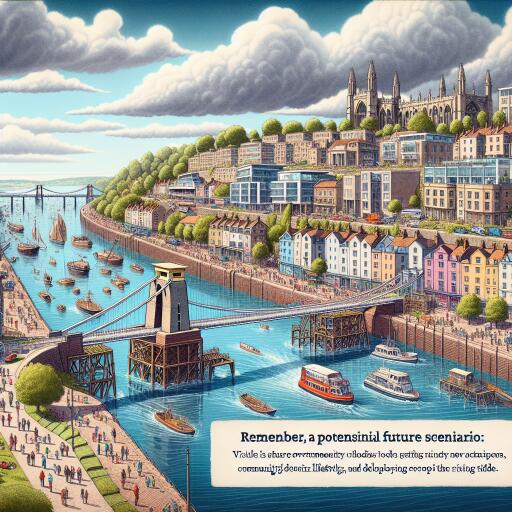
How Rising Sea Levels Could Affect Bristol in the Next Hundred Years
As Bristol navigates an era of unpredictable weather patterns, with localised flooding becoming a more common occurrence due to increased rainfall and occasionally high tides, the city faces a daunting challenge. Notably, warnings have been issued along Bristol’s modest coast, extending from Portishead Point to Avonmouth, and instances where the River Avon has overflowed consecutively, highlighting the urgent reality of our climate crisis.
The recent declaration by the World Meteorological Organisation of 2023 as the hottest year on record, with global average surface temperatures soaring above pre-industrial levels, serves as a stark reminder of the interconnectedness of atmospheric temperatures and oceanic heat – factors directly influencing ice melt and sea-level rise.
Professor Jonathan Bamber, a leading expert from the School of Geographical Sciences at Bristol University, simplifies the dire consequences of global heating, emphasizing the rapid loss of glacier volume witnessed recently in the European Alps. Such drastic changes foreshadow the potential for widespread glacier absence in the coming decades – a scenario barely contemplated until now.
The conversation extends to the implications of accelerated sea-level rise, a development that has hastened significantly since the early 20th century. Predictions from dedicated research suggest that, without a curb on greenhouse emissions, sea levels could rise by up to two meters by 2100. This projection spells potential disaster for low-lying areas in Bristol, including Avonmouth, which could see significant water intrusion, and the impact on infrastructure, such as the critical Severn Beach railway line, could be substantial.
Grahame Madge, a spokesperson from the Met Office, lends a slightly more conservative estimate, anticipating a sea-level rise in the Bristol Channel by up to half a meter by 2100, dependent on global climate mitigation efforts. Despite this, he warns that the acceleration of sea-level rise is inevitable due to the thermal expansion of sea water and the melting of ice from Greenland and Antarctica. Even a total cessation of greenhouse gas emissions would not immediately halt the rise, only slow it, due to the existing atmospheric content.
Such predictions underscore not only the environmental but also geopolitical and economic challenges posed by rising sea levels. Professor Bamber warns of the stark realities facing coastal and island nations, with some facing the threat of complete submergence in the near future.
As we stand on the brink of potentially irreversible changes, the dialogue around climate action and sustainable adaptation strategies becomes increasingly critical. The scenario unfolding in Bristol serves not only as a case study but also as a clarion call for urgent global climate action, bringing to light the tangible impacts of our warming planet on local communities.





Leave a Reply